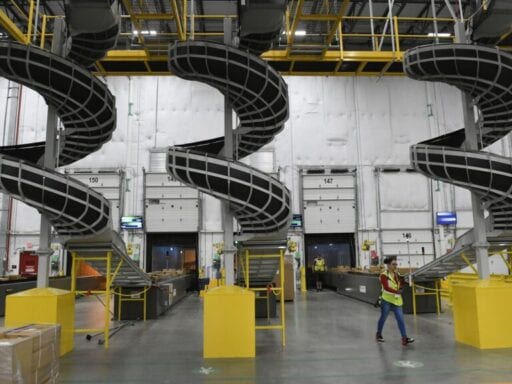Amazon’s warehouse workers feel unsafe amid Covid-19. Amazon’s solution: infrared cameras.
An exclusive Reuters investigation has revealed that Amazon.com is using thermal cameras in warehouses to screen workers for fevers, in hopes of preventing the spread of coronavirus at its facilities in the United States.
Reuters’ Jeffrey Dastin and Krystal Hu explain that the cameras “in effect measure how much heat people emit relative to their surroundings” and “require less time and contact than forehead thermometers, earlier adopted by Amazon.”
The forehead thermometers, as Recode’s Rebecca Heilweil explains, have become a common sight in China, where they’re a widely used surveillance tool for tracking infectious diseases. Their use in US facilities like Amazon fulfillment centers is a more recent development due to coronavirus, and the remote thermal cameras are a still more recent adoption.
The forehead thermometers will remain as a secondary check for workers flagged by the thermal cameras; some workers quoted by Dastin and Hu reported feeling unsafe about performing the thermometer checks, with one saying, “a line once formed outside her warehouse, and employees could not receive masks until after they had entered the building and had their temperatures taken,” raising social distancing concerns.
Amazon told Reuters the thermal camera measure was taken “to support the health and safety of our employees, who continue to provide a critical service in our communities.” It comes after Amazon has faced vocal protests from workers who say the company isn’t adequately safeguarding workers at its warehouses and fulfillment centers. These critiques have garnered a great degree of attention, while Amazon deliveries have become more essential than ever as Americans staying at home turn to online ordering in lieu of brick-and-mortar stores.
As my colleagues Jason Del Rey and Shirin Ghaffary have reported, there have been reported cases of Covid-19 in at least two dozen Amazon facilities in the US. These reports sparked worker protests demanding that the company “provide paid leave for any warehouse worker who feels unsafe working through the pandemic” and “fully close down and deep-clean a facility if any of its employees are diagnosed with Covid-19.”
Some of those raising concerns have been fired by the company. This April, the company fired warehouse worker Bashir Mohamed and corporate employees Emily Cunningham and Maren Costa, who all say they were punished for criticizing the company’s approach to worker safety. An earlier firing, of fulfillment center worker Chris Smalls — who organized a mass walkout to demand a shutdown of his center in Staten Island — prompted an investigation from the New York City Commission on Human Rights and a letter of protest from several US senators. The company’s general counsel, David Zapolsky, reportedly later dismissed Smalls as “not smart, or articulate.” Smalls’s walkout was followed by similar actions by staff at the Amazon-owned Whole Foods grocery store chain.
Amazon has raised warehouse pay and pushed new sanitation efforts like “staggered break times to promote social distancing,” forehead thermometers, mask distribution, and now, the thermal cameras — but it has resisted demands for fulfillment center shutdowns and paid leave for all (not just those with symptoms). In one case it even reopened a distribution center just one day after a worker tested positive.
Support Vox’s explanatory journalism
Every day at Vox, we aim to answer your most important questions and provide you, and our audience around the world, with information that has the power to save lives. Our mission has never been more vital than it is in this moment: to empower you through understanding. Vox’s work is reaching more people than ever, but our distinctive brand of explanatory journalism takes resources — particularly during a pandemic and an economic downturn. Your financial contribution will not constitute a donation, but it will enable our staff to continue to offer free articles, videos, and podcasts at the quality and volume that this moment requires. Please consider making a contribution to Vox today.
Author: Dylan Matthews
Read More



